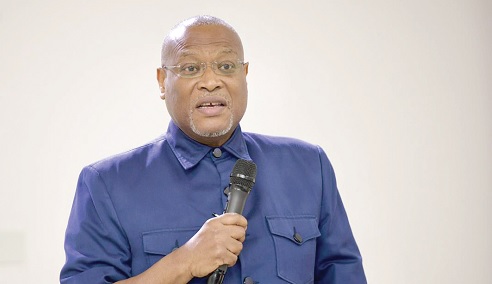
Academic freedom necessary for higher education, democracy — Vice-President
The Vice-President, Professor Naana Jane Opoku-Agyemang, has challenged university staff associations and other relevant actors to see the university environment as a critical watchdog for the promotion of higher education and democratic enhancement in society.
She said the lack of a continental body to represent the interests of academics at the African Union and its human rights bodies such as the African Commission and the African Court on Human and Peoples' Rights had left a major gap.
In a speech read on her behalf by the Chief of Staff at the Office of the Vice-President, Alex Segbefia, Prof. Opoku-Agyemang commended the Africa Coalition for Academic Freedom (ACAF) for its initiative to organise a dialogue to bridge the gap at the sub-regional level
The three-day dialogue is on the theme: "Safeguarding academic freedom in Africa; a continental dialogue for collective action."
About 45 African countries represented by various universities and higher institutions of learning are attending the three-day dialogue on academic freedom to share knowledge and experiences, and also form regional blocs to safeguard academic freedom.
About ACAF
The Africa Coalition for Academic Freedom is a regional coalition that works to promote and protect academic freedom across African higher education institutions.
Launched in 2024 and hosted by the Ghana Centre for Democratic Development (CDD-Ghana) in Accra, it is a partner of the international network, Scholars at Risk.
It develops principles, advocacy strategies and collaborative networks to address challenges to intellectual autonomy on the continent.
It also advocates the freedom of teachers and students to teach, study and conduct research without unreasonable restrictions.
Deliberations
The Vice-President encouraged participants to focus their deliberations on ensuring that leadership development in Africa's public universities promoted academic freedom and democratisation of the university system.
She said the 1992 Constitution of Ghana, for example, recognised academic freedom, in addition to providing certain bulwarks which sought to buttress academic freedom for universities.
Prof. Opoku-Agyemang said it was on the basis of this that in 2018, when the government attempted to pass a bill that could severely violate the tenets of academic freedom and complicate the governance structure of the universities, it was shot down by the university community, non-governmental organisations, public spirited individuals and the Ghana Academy of Arts and Sciences.
Commitment
The Minister of Education, Haruna Iddrisu, reiterated government's commitment to safeguarding academic freedom and ensure that it was used appropriately to help universities achieve the goal of promoting the pursuit, production, dissemination and application of knowledge to improve social, political and economic conditions in the country.
This was contained in a speech delivered on behalf of the minister by Saaka Sayitu of the Ghana Tertiary Education Commission (GTEC).
Mr Iddrisu said a key feature of public universities was the bicameral governance structure - the governing council and the academic board.
He added that the appointment of Vice-Chancellors and Chancellors were also done internally by the universities, while staff appointments ultimately approved by governing councils of universities.
The minister said externally, certain structures had been put in place to ensure accountability and effective collaboration between government and the university, such as the Parliamentary Select Committee on Education, the Public Accounts Committee and the Office of the Auditor-General.
Leadership
The Provost of the College of Humanities of the University of Ghana, Prof. Joseph Yaro, said the university continued to lead in higher education, reaffirming that academic freedom was not a privilege but the life blood of the institution.
"It ensures that research thrives, innovation flourishes, and the truth remains our guiding light," he said.
